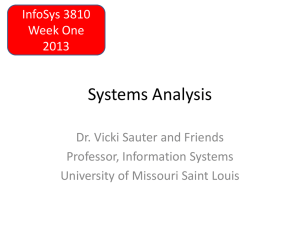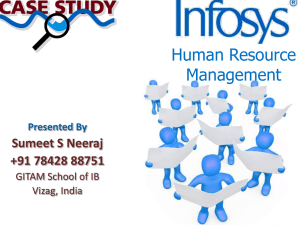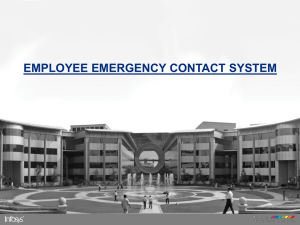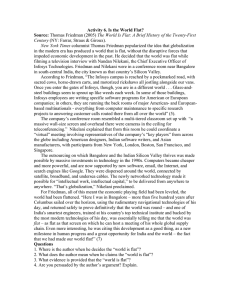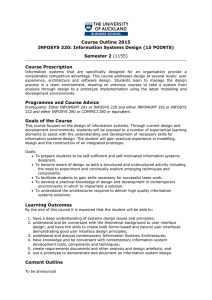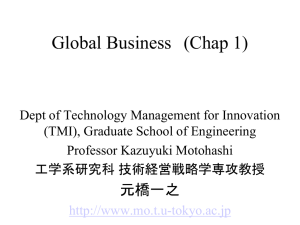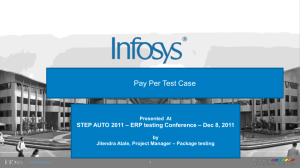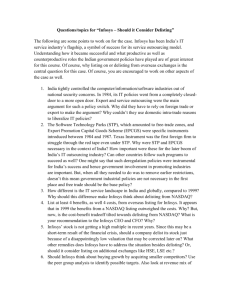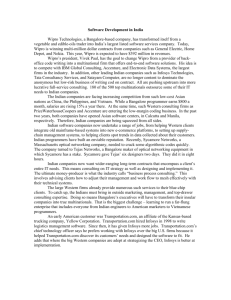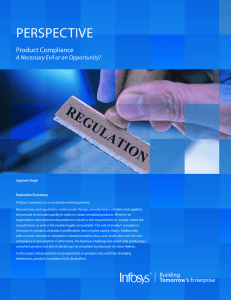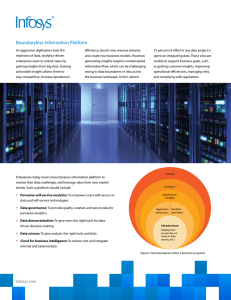Determinants of Success in Global R D: Lessons from India's IT Industry
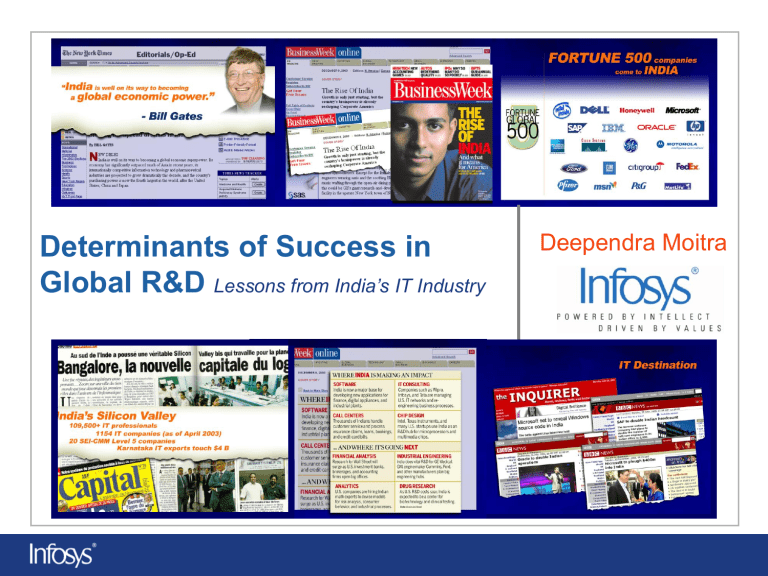
Determinants of Success in
Global R&D
Lessons from India’s IT Industry
Deependra Moitra
Overview
• Indian IT Industry – A Snapshot
• A Case Study of Infosys Technologies
• Synthesizing Learning
• Determinants of Success in Global R&D
• Discussions
Seeking to provide a 360 º view of R&D Globalization
Indian IT Industry – A Snapshot
Infosys Technologies: Facts Sheet
Started in 1981 by 7 people with US $250 and a dream to build a globally respected software company of the professionals, for the professionals, and without compromising on ethics
1999: Listed in NASDAQ (first Indian company)
Year 2004-2005
US $1.5+ Billion in Revenues
Market Cap of US $19 Billion
37000 Employees
Total Number of Clients 440
32 Development Centers and 32 Sales Offices Around the Globe
Has subsidiaries in China and Australia
2004: Set-up Infosys Consulting
Global Company, Global Outreach
Canada
Europe: Stockholm
Brussels
Amsterdam
London
Frankfurt
Paris
Zurich
USA: Atlanta,
Boston,
Chicago,
Dallas,
Detroit,
Los Angeles,
New York,
Fremont,
Seattle
Argentina
India: Bangalore,
Chennai, Pune
Bhubaneswar,
Hyderabad,
Mangalore,
Mohali, Mysore
Delhi, Mumbai
Japan, Australia,
Hong Kong, China,
Singapore, Sharjah,
Mauritius
Infosys in China has a Global Hub …
Incorporated March 2004 as a 100% subsidiary of Infosys, located in Shanghai
PuDong Software Park
Focus on
Offering an alternative offshoring destination to global clients
Providing IT services to regional operations of global clients
Providing IT services to large mainland and North Asian corporations
Growth plans 180 (current) to 2000 (2006)
Plans to expand to other cities in China in the next 24 months
To become a best-in-class provider of software solutions to Global 2000 companies by leveraging technology & talent base of
China
V I S I O N
Infosys China Integrated Innovation Model
Leverages Complementary
Project
Management
Skills
Organizationa l Skills
Strong Tech
Skills
Quality and
Process
Maturity
Domain Skills
Strong
Education
System
Language
Capability
Organizational Drivers (1)
“Business insights, integrated solutions, value multipliers.”
“Powered by intellect, driven by values.”
“The softest pillow is a clear conscience.”
Clients Employees
Investors Society
Value, Delight, Long-term Relationship
“Greater good should always triumph over individual good.”
Organizational Drivers (2)
“In God we trust; everyone else must come with data.”
“The only time and context invariant attributes of a successful organization: innovation, speed and excellence in execution.”
“We should have humility, respect for the competition, and a healthy sense of paranoia; or, we’ll vanish like dew drops on a sunny morning.”
Growth Stimulants
English
Language
Technical
Education
Engineering
Industry
Democracy
Pre-1991
Telecom
Revolution
Capital
Markets
Export
Incentives
Import Tariffs,
Tax Structures
Post-1991
Indian
Diaspora
Technology
Boom
Y2K
Economic
Productivity
Opportunity
Key Learning
• Long-term, value creating, relationship-based model versus transactions based model
– Superior value through competency growth and ownership
• Global presence for a truly global delivery model to deliver on time-to-market, lowered operational cost and reduced cost of quality
• Continuous improvement in quality, productivity and customer satisfaction parameters
• 2-D growth (scale and organizational maturity)
• Source and manage best-inclass “raw material” for the knowledge business
• There are some undesired effects and imbalances, too.
Influencing Factors
Managerial Technical
HR
Management
Cultural IP Management
Infrastructure
Communications
Language
Project
Management
Government /
Ecology
Trust Distance
Centralization
Vs
Decentralization
Coordination and Alignment Mechanisms
Global R&D Progression Model
Skills
Flexibility
Confidence
Performance
Relationship
Business Value
Partner
Ownership
Determinants of Success
Organizational
• Clarity on R&D globalization intent
• Managing organizational change
• R&D globalization model
• Work distribution model
• Integration strategy
• Executive commitment
Policy and Incentives
• Government’s facilitative role
• Tax incentives
• Country attractiveness, economic policies, and educational set-up
• Procedural simplicity
• Minimize geo-political risks
Ecosystem
• Availability of resource pool
(scale and quality)
• Complementarity (venture capital, outsourcing, MNC, R&D Labs)
• Cluster effect and “Spiraling” effect
• Demand creation and opportunities
Other
• Coordination and alignment mechanisms
• Organizational maturity
• Value-based management
• IP regime
Managing Global R&D is a learned competency
$ 1.06 b
Infosys’ growth
1991: $ 2m
Thank You
Questions & Discussions
Deependra Moitra
deependra@moitra.com
www.moitra.com
99 01 02 03 04
